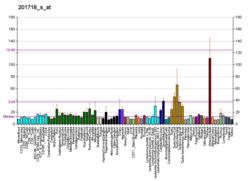EPB41L2
Band 4.1-like protein 2 is a protein that in humans is encoded by the EPB41L2 gene.[3][4][5]
Interactions
EPB41L2 has been shown to interact with FKBP2[6] and GRIA1.[7]
References
- ↑ "Human PubMed Reference:".
- ↑ "Mouse PubMed Reference:".
- ↑ Parra M, Gascard P, Walensky LD, Snyder SH, Mohandas N, Conboy JG (August 1998). "Cloning and characterization of 4.1G (EPB41L2), a new member of the skeletal protein 4.1 (EPB41) gene family". Genomics. 49 (2): 298–306. PMID 9598318. doi:10.1006/geno.1998.5265.
- ↑ Peters LL, Weier HU, Walensky LD, Snyder SH, Parra M, Mohandas N, Conboy JG (January 1999). "Four paralogous protein 4.1 genes map to distinct chromosomes in mouse and human". Genomics. 54 (2): 348–50. PMID 9828140. doi:10.1006/geno.1998.5537.
- ↑ "Entrez Gene: EPB41L2 erythrocyte membrane protein band 4.1-like 2".
- ↑ Walensky, L D; Gascard P; Fields M E; Blackshaw S; Conboy J G; Mohandas N; Snyder S H (April 1998). "The 13-kD FK506 binding protein, FKBP13, interacts with a novel homologue of the erythrocyte membrane cytoskeletal protein 4.1". J. Cell Biol. UNITED STATES. 141 (1): 143–53. ISSN 0021-9525. PMC 2132710
 . PMID 9531554. doi:10.1083/jcb.141.1.143.
. PMID 9531554. doi:10.1083/jcb.141.1.143. - ↑ Shen, L; Liang F; Walensky L D; Huganir R L (November 2000). "Regulation of AMPA receptor GluR1 subunit surface expression by a 4. 1N-linked actin cytoskeletal association". J. Neurosci. UNITED STATES. 20 (21): 7932–40. PMID 11050113.
Further reading
- Andersson B, Wentland MA, Ricafrente JY, et al. (1996). "A "double adaptor" method for improved shotgun library construction.". Anal. Biochem. 236 (1): 107–13. PMID 8619474. doi:10.1006/abio.1996.0138.
- Yu W, Andersson B, Worley KC, et al. (1997). "Large-scale concatenation cDNA sequencing.". Genome Res. 7 (4): 353–8. PMC 139146
 . PMID 9110174. doi:10.1101/gr.7.4.353.
. PMID 9110174. doi:10.1101/gr.7.4.353. - Walensky LD, Gascard P, Fields ME, et al. (1998). "The 13-kD FK506 binding protein, FKBP13, interacts with a novel homologue of the erythrocyte membrane cytoskeletal protein 4.1.". J. Cell Biol. 141 (1): 143–53. PMC 2132710
 . PMID 9531554. doi:10.1083/jcb.141.1.143.
. PMID 9531554. doi:10.1083/jcb.141.1.143. - Shen L, Liang F, Walensky LD, Huganir RL (2001). "Regulation of AMPA receptor GluR1 subunit surface expression by a 4. 1N-linked actin cytoskeletal association.". J. Neurosci. 20 (21): 7932–40. PMID 11050113.
- Kontrogianni-Konstantopoulos A, Frye CS, Benz EJ, Huang SC (2001). "The prototypical 4.1R-10-kDa domain and the 4.1g-10-kDa paralog mediate fodrin-actin complex formation.". J. Biol. Chem. 276 (23): 20679–87. PMID 11274145. doi:10.1074/jbc.M010581200.
- Gimm JA, An X, Nunomura W, Mohandas N (2002). "Functional characterization of spectrin-actin-binding domains in 4.1 family of proteins.". Biochemistry. 41 (23): 7275–82. PMID 12044158. doi:10.1021/bi0256330.
- Binda AV, Kabbani N, Lin R, Levenson R (2002). "D2 and D3 dopamine receptor cell surface localization mediated by interaction with protein 4.1N.". Mol. Pharmacol. 62 (3): 507–13. PMID 12181426. doi:10.1124/mol.62.3.507.
- Delhommeau F, Vasseur-Godbillon C, Leclerc P, et al. (2002). "A splicing alteration of 4.1R pre-mRNA generates 2 protein isoforms with distinct assembly to spindle poles in mitotic cells.". Blood. 100 (7): 2629–36. PMID 12239178. doi:10.1182/blood.V100.7.2629.
- Strausberg RL, Feingold EA, Grouse LH, et al. (2003). "Generation and initial analysis of more than 15,000 full-length human and mouse cDNA sequences.". Proc. Natl. Acad. Sci. U.S.A. 99 (26): 16899–903. PMC 139241
 . PMID 12477932. doi:10.1073/pnas.242603899.
. PMID 12477932. doi:10.1073/pnas.242603899. - Lu D, Yan H, Othman T, et al. (2004). "Cytoskeletal protein 4.1G binds to the third intracellular loop of the A1 adenosine receptor and inhibits receptor action.". Biochem. J. 377 (Pt 1): 51–9. PMC 1223836
 . PMID 12974671. doi:10.1042/BJ20030952.
. PMID 12974671. doi:10.1042/BJ20030952. - Ralston KJ, Hird SL, Zhang X, et al. (2004). "The LFA-1-associated molecule PTA-1 (CD226) on T cells forms a dynamic molecular complex with protein 4.1G and human discs large.". J. Biol. Chem. 279 (32): 33816–28. PMID 15138281. doi:10.1074/jbc.M401040200.
- Beausoleil SA, Jedrychowski M, Schwartz D, et al. (2004). "Large-scale characterization of HeLa cell nuclear phosphoproteins.". Proc. Natl. Acad. Sci. U.S.A. 101 (33): 12130–5. PMC 514446
 . PMID 15302935. doi:10.1073/pnas.0404720101.
. PMID 15302935. doi:10.1073/pnas.0404720101. - Rual JF, Venkatesan K, Hao T, et al. (2005). "Towards a proteome-scale map of the human protein-protein interaction network.". Nature. 437 (7062): 1173–8. PMID 16189514. doi:10.1038/nature04209.
- Beausoleil SA, Villén J, Gerber SA, et al. (2006). "A probability-based approach for high-throughput protein phosphorylation analysis and site localization.". Nat. Biotechnol. 24 (10): 1285–92. PMID 16964243. doi:10.1038/nbt1240.
- Ewing RM, Chu P, Elisma F, et al. (2007). "Large-scale mapping of human protein-protein interactions by mass spectrometry.". Mol. Syst. Biol. 3 (1): 89. PMC 1847948
 . PMID 17353931. doi:10.1038/msb4100134.
. PMID 17353931. doi:10.1038/msb4100134.
This article is issued from
Wikipedia.
The text is licensed under Creative Commons - Attribution - Sharealike.
Additional terms may apply for the media files.

